Walking into your laundry room only to be greeted by an unpleasant, foul odor akin to a dead animal can be quite unsettling. This problem, while less common, can occur due to various reasons, such as trapped rodents, clogged drains, or even mold and mildew. The following guide aims to help you identify the source of this uninvited nuisance and provide practical solutions to restore freshness to your laundry room. Let’s dive in and tackle this issue together.
Causes for the Unpleasant Odor in My Laundry Room
Trapped Rodents
One of the most common reasons for a foul smell resembling a dead animal in your laundry room could be a trapped or dead rodent. Mice, rats, or other small creatures can sometimes find their way into your duct systems or walls and die there. The decomposition process emits a strong, unpleasant odor that permeates the room.
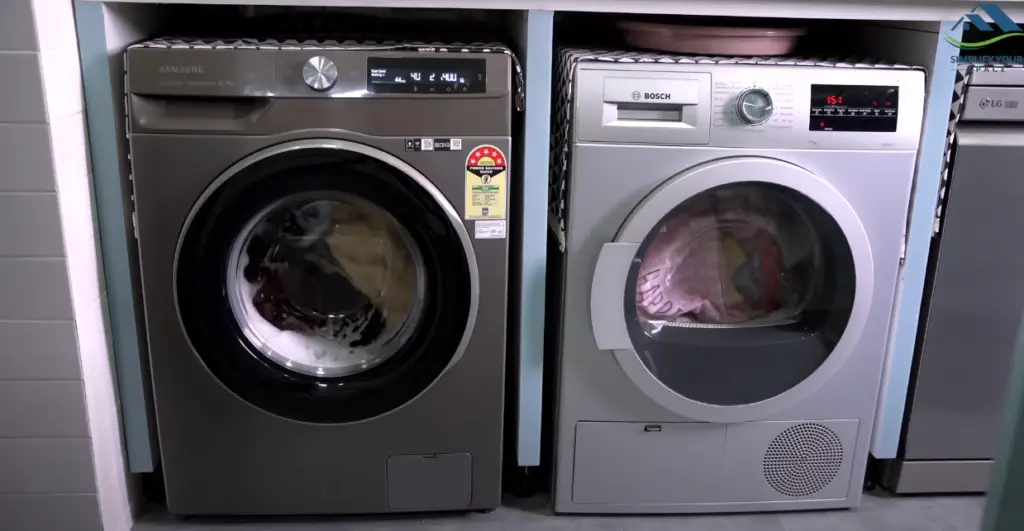
Clogged Drains
Another possible cause of this offensive smell could be a clogged drain. Accumulated debris, including hair, food scraps, and other decaying matter stuck in your laundry room drain, can give off an awful smell over time.
Mold and Mildew
High humidity levels and poor ventilation in a laundry room can lead to the growth of mold and mildew. These fungi release mycotoxins that can emit a musty, unfavorable smell, often mistaken for the scent of a dead animal.
Unused Appliances
If you have laundry appliances that are seldom used, stagnant water could accumulate and promote bacterial growth. Over time, this can result in a nasty smell that is similar to that of a deceased creature.[2]
Getting Rid of Dead Animal Smell in My Laundry Room
Locate the Source
The first step in eradicating the unpleasant aroma is identifying its source. Check the areas where a rodent may have died, such as ducts or walls. Inspect your drains for any blockages and examine your laundry appliances for stagnant water. If you have a damp laundry room, check for visible signs of mold or mildew growth.
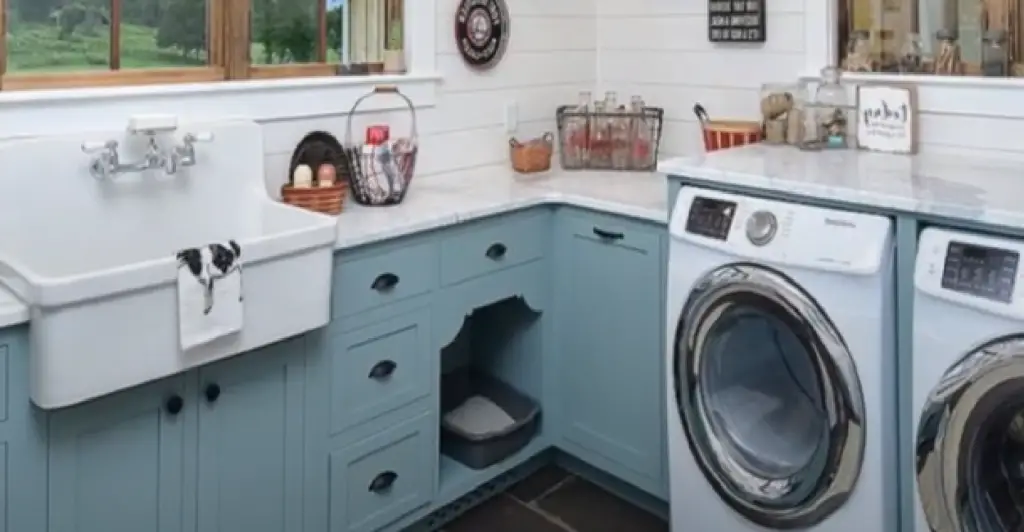
Remove the Dead Animal
If the smell is due to a dead rodent, removing the carcass is crucial. You may need assistance from pest control professionals. Once removed, clean the area thoroughly using a disinfectant.
Clean the Drains
If a clogged drain is causing the smell, regular cleaning can solve the problem. Use a plumbing snake to remove the debris, followed by a drain cleaner. In severe cases, you might need professional help.
Treat Mold and Mildew
If mold or mildew is the culprit, use a mixture of bleach and water to clean the affected area. Ensure your laundry room is well-ventilated to prevent further growth.
Regular Use and Maintenance of Appliances
To prevent smells from unused appliances, try to use them regularly. Drain any stagnant water and clean your appliances periodically.
Remember, if the problem persists, it’s advisable to seek professional help. They are equipped with the right tools and expertise to diagnose and resolve the issue effectively.
How can you eliminate a musty odor?
Eliminating a musty odor from your laundry room involves a few steps. First, improve ventilation by opening windows or installing exhaust fans to reduce the room’s humidity levels, a leading cause of musty odors. Next, regularly clean your laundry appliances and room surfaces with a mixture of vinegar and water, which is effective in removing musty smells. Consider using baking soda in your washing cycles as it is excellent at absorbing odors. Also, frequently empty the lint tray in your dryer as the lint can often trap moisture and create a musty smell. If your laundry room has carpets or rugs, ensure they are cleaned or replaced regularly. Finally, if the musty odor persists, a dehumidifier can help to control the humidity levels in the room, thereby preventing the growth of mold and mildew which often cause musty smells.
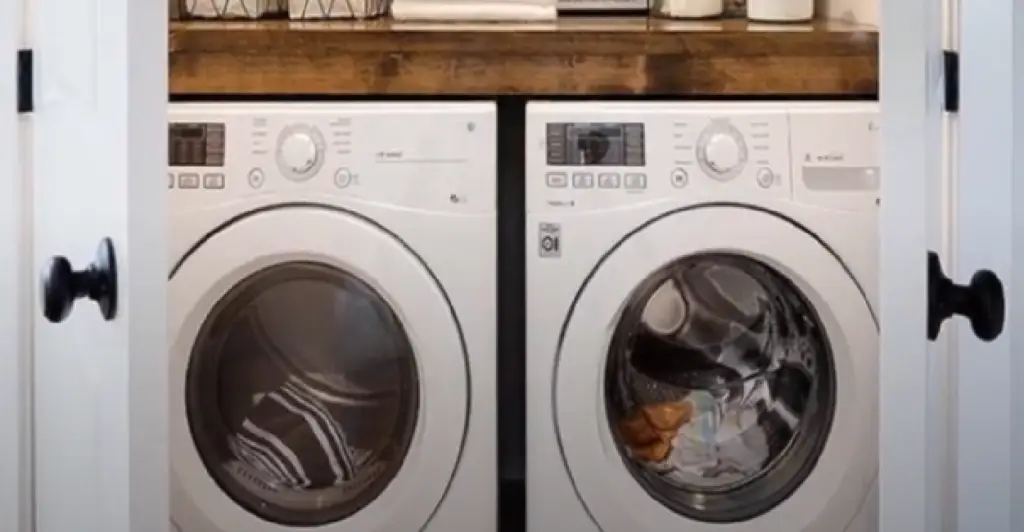
What can eliminate the odor of rodents?
Eliminating the odor of rodents involves a multi-step process. First, locate and safely remove the dead rodent if it is accessible. You must then thoroughly clean and disinfect the area where the carcass was found. Natural deodorizers such as vinegar and baking soda can help neutralize any remaining odors.
If the odor is particularly strong and pervasive, professional pest control services may be required as they have specialized equipment and treatments that can effectively neutralize and eliminate such odors. [1]
Is a sewer-like odor during laundry harmful?
Yes, a sewer-like odor during laundry can be potentially harmful. The smell often indicates the presence of sewer gases like hydrogen sulfide, ammonia, and methane, which can lead to various health problems if inhaled over an extended period. Low levels of these gases can cause headaches, dizziness, or nausea, while high concentrations can lead to more severe health issues including pneumonia, loss of consciousness, or even death in extremely high concentrations. Also, methane is highly flammable, posing a risk of explosion. Therefore, it’s essential to address this issue promptly by identifying and fixing the source of the odor. Professional help may be required in some cases.

The Impact of Mold on Your Health and Home
Mold, a pervasive and unwelcome guest in many homes, poses significant threats to both the health of individuals and the integrity of the home structure.
Prolonged contact with mold spores can exacerbate existing health conditions and may lead to the development of asthma or other respiratory illnesses.
From a structural perspective, mold undermines the integrity of your home. It thrives in damp, humid areas and can latch onto various materials such as wood, drywall, and insulation, gradually damaging these components. Over time, this can lead to expensive repair work and could potentially harm the overall value of your home. Therefore, promptly identifying and addressing mold growth is crucial not just for your well-being, but also for maintaining your home’s structural soundness.[4]
Solutions to a Smelly Laundry Room
Regular Cleaning
Performing regular cleaning is one of the most effective solutions to a smelly laundry room. This entails washing the interior of your washing machine, cleaning the dryer’s lint trap, and wiping down the countertops, sink, and cupboards. Use a solution of vinegar and water to disinfect the area, as vinegar is efficient at eliminating unpleasant odors.
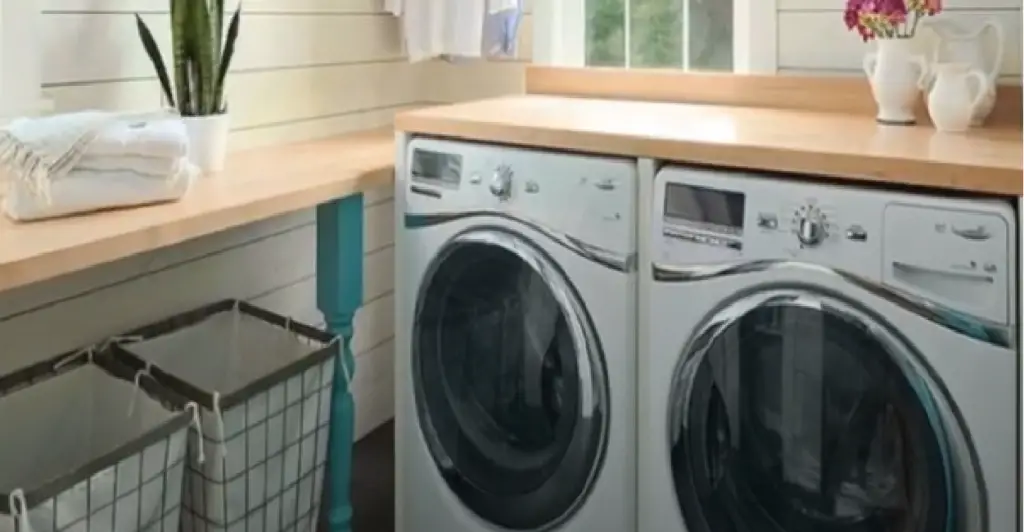
Proper Ventilation
Ensure sufficient ventilation in your laundry room to prevent the accumulation of moist, stale air. If your laundry room lacks windows, consider installing an exhaust fan or a dehumidifier to help maintain a dry atmosphere.
Odor Absorbers
Consider using odor absorbers such as baking soda, activated charcoal, or dehumidifiers. These substances can absorb unpleasant odors, leaving your laundry room smelling fresh. For instance, you could leave an open box of baking soda in the room or hang bags of activated charcoal.
Regularly Check for Leaks
Leaks can lead to dampness, fostering conditions for mold and mildew growth. Regularly inspect your washing machine, laundry tub, and dryer for any leaks and repair them promptly to prevent a smelly room.
Use Fragranced Products
Fragranced cleaning products or laundry additives can help mask unpleasant odors. However, be careful if you or any household member is sensitive to strong scents.
By implementing these solutions, you can maintain a fresh, pleasant-smelling laundry room, ensuring a more enjoyable laundry experience.[3]
FAQ
When Should You Call Professional Help?
If the unpleasant odor in your laundry room persists despite your diligent efforts, it might be worth considering the assistance of a professional. Additionally, if you discover a large mold infestation, it’s recommended to call in a mold remediation expert, as improper handling can cause mold spores to disperse and worsen the situation. It’s also crucial to contact professionals if the source of the smell is a dead animal located in an inaccessible area, like within walls or ducts. A pest control professional can safely remove the carcass and recommend measures to deter future infestations. Lastly, if the smell is sewer-like and persistent, it could indicate a serious plumbing issue, warranting immediate consultation with a plumber or a sewage professional.
Why does my laundry room smell rotten?
There are several potential causes for a foul odor emanating from your laundry room. One common cause is a buildup of bacteria or mold due to excess moisture or poor ventilation. This could occur if your washing machine or dryer is not being used regularly, leading to dampness, or if there are leaks within these appliances. Another likely cause could be a dead rodent or animal in an unseen location, such as inside walls or vents. Lastly, a blocked or backed-up drain could also be responsible for a rotten odor. In any of these cases, identifying and addressing the source of the smell is critical to eliminating it.
Why does my laundry room smell musty?
If you notice a persistent, unpleasant smell in your laundry room, it could be a sign of mold or mildew presence, which thrives in damp and poorly ventilated areas. This can occur if the laundry room doesn’t have adequate ventilation or if there’s a leak causing excess moisture. Additionally, infrequent use of your washing machine or dryer can lead to stagnant water, providing an ideal environment for mold and mildew growth. Other potential causes could be old, damp laundry left sitting in the washer or a clogged dryer vent. To eliminate the musty smell, it’s important to address these issues promptly, ensuring the room is well-ventilated and dry, and that laundry appliances are cleaned and maintained regularly.
Can vinegar remove clothes odor?
Yes, vinegar can effectively remove odor from clothes. It works by breaking down the odor molecules and neutralizing the smell. For optimal results, add one cup of white vinegar to your washing machine’s rinse cycle. It’s important to note that the vinegar smell will dissipate once the clothes are dried properly, leaving your clothes with a fresh and clean scent. Furthermore, vinegar can serve as a natural fabric softener, imparting a pleasant softness to your garments post-wash. However, it’s always recommended to do a patch test first, as it may not be suitable for all fabric types.
In addition to white distilled vinegar, use baking soda in your wash cycles. It’s great at absorbing odors! Additionally, enhance the fragrance of your laundry by incorporating a few drops of essential oils. Finally, drying the clothes outdoors in natural sunlight can provide an additional boost of freshness. With the right combination of these techniques, you can keep your laundry smelling clean and fresh. [5]
Is a musty smell always mold?
No, a musty smell is not always indicative of mold. While it’s true that mold or mildew often gives off a musty odor, there are other potential culprits as well. For instance, if a laundry room is not frequently used or properly ventilated, stagnant air can create a musty smell. Similarly, damp clothing or fabrics left in the room for an extended period can lead to a musty odor. Even dust accumulation can sometimes emit a musty scent. Therefore, while a musty smell can indicate the presence of mold or mildew, it’s not the sole indicator. If you suspect mold despite not seeing any visible signs, it’s best to contact a professional to conduct a thorough evaluation.
How can I remove rat odor from a washing machine effectively?
Effectively removing rat odor from a washing machine involves a multi-step process. First, ensure the machine is unplugged and safely turned off. Then, wearing protective gloves, thoroughly clean any visible debris or remnants of the rodent. Once you’ve completed that, proceed to fill the washer with hot water, add 2 cups of bleach, and run a full cycle to disinfect the machine. If the odor persists, repeat the process, but this time use a mixture of 2 cups of white vinegar and 1/2 cup of baking soda. These natural ingredients can help neutralize stubborn odors. Finally, leave the washing machine door open after the cleaning process to allow it to air out. If the smell still lingers, it’s advisable to contact a professional cleaner or pest control expert to ensure all traces of the rodent and its odor are completely eliminated.
By following these steps and taking preventive measures, like sealing off any potential entry points, you can deter future infestations and maintain a safe and odor-free laundry room.
What are the long-term effects of living with bad odors in the home?
Living with bad odors in the home can have serious impacts on mental health and well-being. Odors that linger for a prolonged period can become unbearable, causing feelings of depression, anxiety, frustration, and restlessness. Additionally, these odors can cause difficulty in breathing and headaches due to the toxins they contain. In some cases, people may even suffer from nausea or dizziness. Furthermore, bad odors can also interfere with sleep quality as a result of their persistent presence. Therefore, it’s important to address any odor-related issues promptly and take measures to ensure they don’t return, thereby maintaining a safe and healthy living environment.
In addition to the physical implications, bad odors in the home can also be damaging to relationships with family members or roommates. Living in an unpleasant-smelling environment can cause tension and resentment, leading to conflicts. Moreover, a home with bad odors can be embarrassing if visitors drop by unexpectedly.
Therefore, it is paramount to take the necessary steps to eliminate any odor-related issues without delay in order to maintain an ideal living space and positive relationships. [6]
What are some tips for preventing a foul-smelling laundry room?
To keep a laundry room smelling fresh, it’s essential to prioritize proper ventilation, regularly clean and maintain all appliances, and routinely empty the lint trap in your dryer. Additionally, you should check for any evidence of rodents or pests such as droppings, nests, or trails of chew marks which could indicate an infestation. If you do find evidence, contact a local pest control professional for assistance. Lastly, make sure your washing machine hoses are not clogged, and inspect them regularly for any signs of wear and tear.
By following these tips, you can minimize the chances of a foul-smelling laundry room and maintain a fresh and pleasant scent.
How long does a dead mouse smell last?
The smell of a dead mouse can last anywhere from a week to about a month, depending on various factors. If the mouse is in a humid or poorly ventilated area, the smell could linger longer as the decomposition process is slower. On the other hand, if the mouse is in a dry, well-ventilated environment, the smell could disappear faster. Size also matters; larger rodents will take longer to decompose and therefore produce a lingering smell. It’s important to remove the carcass as soon as possible to minimize the odor, and consider hiring a professional if you cannot locate or reach it. Following removal, sanitize the area to eliminate any remaining smell and prevent further pest issues.
Why does my laundry smell worse?
Multiple factors could contribute to the unpleasant odor lingering on your laundry post-wash. One issue is the excessive use of detergent or fabric softener.
Overuse of these products can build up in your machine, trapping bacteria and odors. Similarly, washing in cold water might not be sufficient to kill bacteria, especially if you’re dealing with heavily soiled clothes.
Another potential cause is leaving damp laundry in the machine for too long. Moist environments are perfect breeding grounds for bacteria, which can result in musty odors.
Using a washing machine that needs cleaning could also be the culprit. Mold and mildew can grow in machines, especially in front-load washers.
Lastly, if your water source is high in sulfur, it can make your clothes smell like rotten eggs.
To combat these issues, make sure to use the right amount of detergent, wash in warm or hot water when possible, promptly transfer laundry to the dryer, clean your washing machine regularly, and if you have high sulfur water, consider installing a water treatment system.[4]
Is it common for a laundry room to have an odor?
While it’s not unusual for a laundry room to have a certain smell due to the nature of its purpose, persistent or noticeably foul odors are not the norm and can indicate underlying issues. Normal laundry room smells can be attributed to laundry detergents, fabric softeners, or even freshly cleaned laundry.
However, musty, sour, or other unpleasant odors could signal problems such as mold, mildew, a buildup of lint, or even pest infestations. In such cases, it’s necessary to identify and address the source of the smell to prevent further issues.
Does the dead animal smell go away?
Yes, the smell of a dead animal will eventually go away on its own. This process can take anywhere from a few days to a few weeks, depending on factors like the size of the animal, the location of the carcass, and the environmental conditions. However, it’s advisable not to wait for the smell to disappear naturally.
Instead, it’s best to locate and remove the dead animal as soon as possible, and then clean and deodorize the area. If you can’t find the animal or if it’s located in a hard-to-reach area, you might need to hire a professional to assist with removal and cleanup. Regular cleaning and good ventilation will also aid in the elimination of the smell.[6]
Useful Video: Washing Machine – Laundry Room Smell / Odor
Conclusion
In conclusion, a foul-smelling laundry room can be a result of several factors including mold, mildew, stagnant air, damp clothing, dust accumulation, or even a dead rodent. Thankfully, there are various methods to eliminate these odors, including the use of natural deodorizers such as vinegar and baking soda, ensuring regular cleaning and proper maintenance of your washing machine, and good ventilation. It’s also important to avoid common laundry mistakes like using too much detergent, leaving damp clothes in the machine for too long, or neglecting your washing machine’s cleanliness. If an odor persists, or if you suspect an issue like a dead rodent or mold, it’s best to consult a professional. By staying vigilant and proactive, you can keep your laundry room fresh and inviting.
References:
- https://homeardent.com/laundry-room-smells-like-dead-animal/
- https://www.allamericanpha.com/blog/4-reasons-your-home-smells-musty-and-how-to-fix-them/
- https://www.grove.co/blog/get-rid-of-musty-smells
- https://molekule.com/blogs/all/musty-smells-getting-rid-of-them-from-your-home-clothes
- https://lettiandco.com/house-smells-like-sewer-when-doing-laundry/
- http://www.wildlife-removal.com/badsmellhouse.html





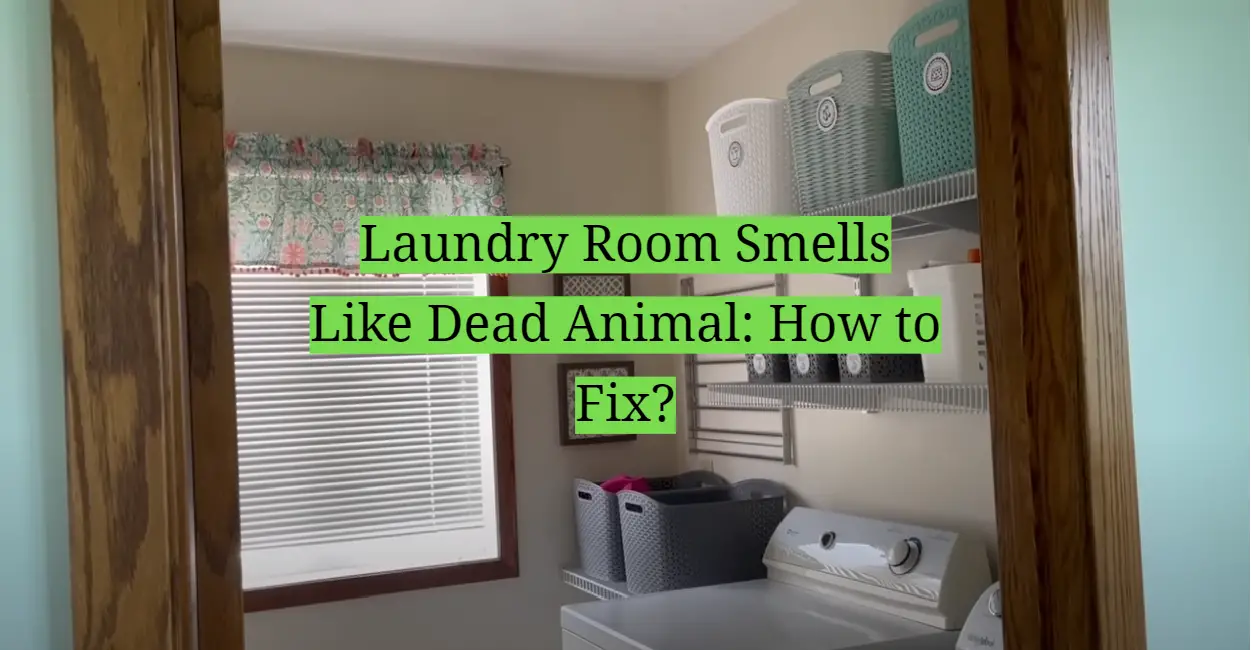








Leave a Reply